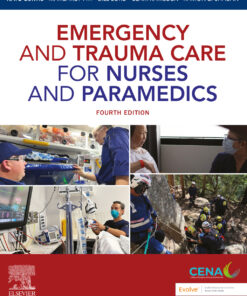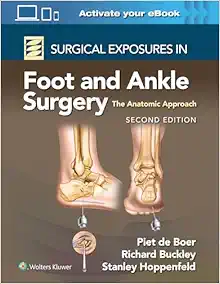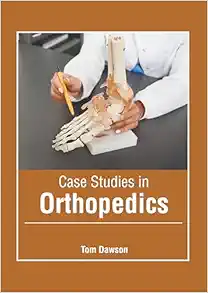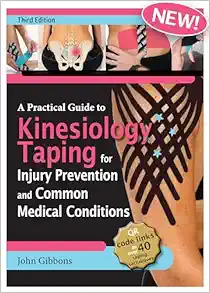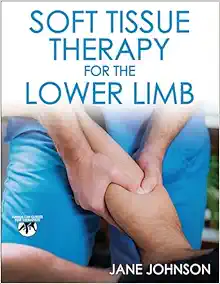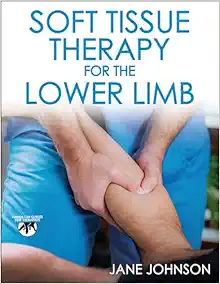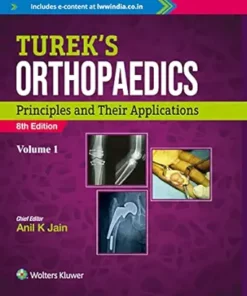ORTHOPAEDICS SURGERY
Emergency and Trauma Care for Nurses and Paramedics, 4th Edition (True PDF from Publisher)
ORTHOPAEDICS SURGERY
ORTHOPAEDICS SURGERY
Thieme Dissector Volume 2: Abdomen and Lower Limb, 2nd Edition (Original PDF from Publisher)
ORTHOPAEDICS SURGERY
Thieme Dissector Volume 1: Upper Limb and Thorax, 2nd Edition (Original PDF from Publisher)
ORTHOPAEDICS SURGERY
Imagerie musculosquelettique traumatique (Original PDF from Publisher)
ORTHOPAEDICS SURGERY
Atlas de anatomía palpatoria: Tomo 2, Miembro inferior, 6th Edition (True PDF from Publisher)
ORTHOPAEDICS SURGERY
Screening in der Physiotherapie, 2nd Edition (Original PDF from Publisher)
ORTHOPAEDICS SURGERY
ORTHOPAEDICS SURGERY
ORTHOPAEDICS SURGERY
Stoller’s Orthopaedics and Sports Medicine: The Hip (Original PDF from Publisher)
ORTHOPAEDICS SURGERY
Rockwood and Green’s Fractures in Adults, 10th edition (EPUB + Converted PDF)
ORTHOPAEDICS SURGERY
Befunderhebung: Grundlagenwissen für die Physiotherapie, 6th Edition (True PDF from Publisher)
ORTHOPAEDICS SURGERY
Moderne Wundversorgung, 10th Edition (German Edition) (True PDF from Publisher)
ORTHOPAEDICS SURGERY
Pflegewissen Wunden, 3rd Edition (German Edition) (True PDF from Publisher)
ORTHOPAEDICS SURGERY
ORTHOPAEDICS SURGERY
Revision Total Knee Arthroplasty, 3rd edition (Original PDF from Publisher)
ORTHOPAEDICS SURGERY
ORTHOPAEDICS SURGERY
Soft Tissue Therapy for the Lower Limb (Original PDF from Publisher)
ORTHOPAEDICS SURGERY
ORTHOPAEDICS SURGERY
Atención inicial al trauma grave: Las primeras 24 horas (Original PDF from Publisher)
Introduction
Orthopaedic surgery is a specialized field of medicine that focuses on the diagnosis, treatment, and prevention of musculoskeletal disorders. It can help improve mobility, reduce pain, and restore function to those suffering from orthopaedic conditions. Understanding the benefits of orthopaedic surgery is essential for anyone considering this type of treatment. In this article, we’ll discuss what you need to know about the potential benefits of orthopaedic surgery and how it can help improve your quality of life.
Overview of Orthopaedic Surgery: Types, Benefits, and Risks
Orthopaedic surgery is a medical specialty that focuses on the diagnosis, treatment, and prevention of musculoskeletal disorders. Orthopaedic surgeons use a variety of techniques to treat conditions such as fractures, joint replacements, spinal deformities, and sports injuries. Orthopaedic surgery can help improve mobility, reduce pain, and restore function.
Types of Orthopaedic Surgery
There are many different types of orthopaedic surgery. Some of the most common include:
Joint Replacement Surgery: This type of surgery involves replacing a damaged or diseased joint with an artificial one. Common joints that may be replaced include the hip, knee, shoulder, elbow, and ankle.
Fracture Repair Surgery: This type of surgery is used to repair broken bones. It may involve using metal plates, screws, and rods to hold the bone in place while it heals.
Spinal Surgery: This type of surgery is used to correct spinal deformities, such as scoliosis, and to treat conditions such as herniated discs and spinal stenosis.
Sports Medicine Surgery: This type of surgery is used to treat sports-related injuries, such as torn ligaments and tendons.
Arthroscopic Surgery: This type of surgery is used to diagnose and treat joint problems without making large incisions.
Benefits of Orthopaedic Surgery
Orthopaedic surgery can provide many benefits, including:
Improved Mobility: Orthopaedic surgery can help improve mobility by restoring normal joint function.
Reduced Pain: Orthopaedic surgery can help reduce pain by correcting the underlying cause of the pain.
Restored Function: Orthopaedic surgery can help restore normal function to a damaged or diseased joint.
Risks of Orthopaedic Surgery
Although orthopaedic surgery can provide many benefits, there are also risks associated with the procedure. These risks include:
Infection: Infection is a potential risk of any surgical procedure.
Blood Clots: Blood clots can form after surgery, which can lead to serious complications.
Nerve Damage: Nerve damage can occur during surgery, which can lead to numbness, tingling, or weakness.
Reaction to Anesthesia: An allergic reaction to anesthesia can occur during surgery, which can lead to serious complications.
Overall, orthopaedic surgery can provide many benefits, but it is important to understand the risks associated with the procedure before undergoing surgery. It is important to discuss all of your options with your doctor before deciding if orthopaedic surgery is right for you.
The Role of Physical Therapy in Post-Surgery Recovery
Physical therapy plays an important role in post-surgery recovery. It is a vital part of the healing process and can help patients regain strength, mobility, and function after surgery. Physical therapists are trained to assess and treat a variety of conditions, including those related to surgery.
Physical therapy helps patients recover from surgery by reducing pain, improving range of motion, increasing strength, and restoring normal movement patterns. Physical therapists use a variety of techniques to achieve these goals, such as manual therapy, therapeutic exercise, and modalities like heat, cold, and electrical stimulation.
Manual therapy involves hands-on techniques that help reduce pain and improve joint mobility. Therapeutic exercises are designed to increase strength, flexibility, and endurance. Modalities like heat, cold, and electrical stimulation can be used to reduce pain and inflammation.
Physical therapists also provide education and instruction on proper body mechanics and posture. This helps patients learn how to move safely and efficiently, which can reduce the risk of injury and further complications.
Physical therapy can help patients return to their pre-surgery level of activity and function. It can also help prevent future injuries and complications. Physical therapists work closely with surgeons and other healthcare professionals to ensure that patients receive the best possible care.
Physical therapy is an essential part of post-surgery recovery. It can help reduce pain, improve range of motion, increase strength, and restore normal movement patterns. With the help of a physical therapist, patients can make a full and successful recovery from surgery.
Preparing for Orthopaedic Surgery: What to Expect
Preparing for orthopaedic surgery can be a daunting experience, but it is important to understand what to expect before, during, and after the procedure. Knowing what to expect can help you feel more prepared and confident in your decision to undergo surgery.
Before the Surgery
Prior to your surgery, you will need to meet with your doctor to discuss the details of the procedure. During this appointment, your doctor will review your medical history, perform a physical exam, and answer any questions you may have. You will also need to provide information about any medications you are taking, including over-the-counter drugs, vitamins, and supplements. Your doctor may also order additional tests, such as X-rays or blood work, to ensure that you are healthy enough for surgery.
In addition to meeting with your doctor, you will need to make arrangements for your care after the surgery. This may include arranging for someone to drive you home from the hospital, setting up a place for you to rest and recover, and stocking up on supplies such as bandages and pain medication.
During the Surgery
On the day of your surgery, you will need to arrive at the hospital early. You will likely be asked to change into a hospital gown and remove any jewelry or other items that could interfere with the procedure. You may also be given a sedative to help you relax before the surgery begins.
Once you are in the operating room, the surgeon will make an incision in the affected area and begin the procedure. Depending on the type of surgery, you may be awake or asleep during the procedure. If you are awake, you may be asked to move your body in certain ways to help the surgeon complete the procedure.
After the Surgery
After the surgery is complete, you will be taken to a recovery room where you will be monitored until you are stable enough to go home. You may be given pain medication to help manage any discomfort. You will also be given instructions on how to care for yourself at home, including how to manage your pain and when to return for follow-up appointments.
Recovery from orthopaedic surgery can take several weeks or months, depending on the type of procedure you had. During this time, it is important to follow your doctor’s instructions and take it easy. You may need to use crutches or a cane to help you get around, and you should avoid strenuous activities until your doctor gives you the okay.
By understanding what to expect before, during, and after orthopaedic surgery, you can feel more prepared and confident in your decision to undergo the procedure. With the right preparation and care, you can make a full recovery and get back to living your life.
Understanding the Cost of Orthopaedic Surgery
Orthopaedic surgery is a specialized field of medicine that focuses on the diagnosis, treatment, and prevention of musculoskeletal disorders. Orthopaedic surgeons are highly trained medical professionals who specialize in treating conditions such as fractures, joint replacements, spinal deformities, and sports injuries. While orthopaedic surgery can be an effective way to treat many musculoskeletal conditions, it is important to understand the cost associated with this type of surgery before making any decisions.
The cost of orthopaedic surgery will vary depending on the type of procedure being performed, the complexity of the surgery, and the location of the hospital or clinic where the surgery is taking place. Generally speaking, the cost of orthopaedic surgery can range from several hundred dollars to tens of thousands of dollars. In addition to the cost of the surgery itself, there may also be additional costs associated with pre-operative tests, post-operative care, and medications.
When considering the cost of orthopaedic surgery, it is important to factor in all of the associated costs. This includes the cost of the surgeon’s fee, the cost of the hospital or clinic where the surgery is taking place, the cost of any necessary pre-operative tests, and the cost of any post-operative care or medications. It is also important to consider any insurance coverage that may be available to help cover the cost of the surgery.
In some cases, the cost of orthopaedic surgery may be covered by health insurance. However, it is important to check with your insurance provider to determine what types of procedures are covered and what the associated costs may be. Additionally, some hospitals and clinics may offer payment plans or discounts for certain types of orthopaedic surgeries.
It is important to understand the cost of orthopaedic surgery before making any decisions. By understanding the associated costs, you can make an informed decision about whether or not the surgery is right for you. Additionally, it is important to discuss the cost of the surgery with your doctor and insurance provider to ensure that you are fully aware of all of the associated costs.
Exploring Alternative Treatments to Orthopaedic Surgery
Exploring alternative treatments to orthopaedic surgery is an important part of managing musculoskeletal conditions. Orthopaedic surgery is a major medical intervention that can be used to treat a variety of musculoskeletal conditions, including fractures, dislocations, and joint replacements. However, it is not always the best option for every patient. Alternative treatments to orthopaedic surgery may include physical therapy, medications, lifestyle modifications, and other non-surgical interventions.
Physical therapy is one of the most common alternatives to orthopaedic surgery. Physical therapists are trained to assess and treat musculoskeletal conditions using a variety of techniques, such as stretching, strengthening, and range of motion exercises. These exercises can help reduce pain, improve mobility, and restore function. Physical therapy can also be used to prevent future injuries and improve overall health.
Medications are another alternative to orthopaedic surgery. Nonsteroidal anti-inflammatory drugs (NSAIDs) are commonly used to reduce inflammation and pain associated with musculoskeletal conditions. Other medications, such as corticosteroids, can also be used to reduce inflammation and pain. In some cases, medications can be used to slow the progression of certain conditions or even reverse them.
Lifestyle modifications are also an important part of managing musculoskeletal conditions. This includes avoiding activities that can aggravate the condition, such as repetitive motions or heavy lifting. It also involves maintaining a healthy weight, eating a balanced diet, and getting regular exercise. These lifestyle changes can help reduce pain and improve overall health.
Other non-surgical interventions can also be used to manage musculoskeletal conditions. These include acupuncture, massage, chiropractic care, and ultrasound therapy. Each of these treatments has its own benefits and risks, so it is important to discuss them with your doctor before beginning any treatment.
Exploring alternative treatments to orthopaedic surgery is an important part of managing musculoskeletal conditions. Physical therapy, medications, lifestyle modifications, and other non-surgical interventions can all be used to reduce pain, improve mobility, and restore function. It is important to discuss all of your options with your doctor before deciding on a course of treatment.
Conclusion
Orthopaedic surgery can be a life-changing experience for those who suffer from musculoskeletal conditions. It can help to reduce pain, improve mobility, and restore function. While there are risks associated with any type of surgery, the benefits of orthopaedic surgery often outweigh the risks. Patients should discuss their options with their doctor to determine if orthopaedic surgery is right for them. With the right care and support, orthopaedic surgery can be a successful and rewarding experience.


